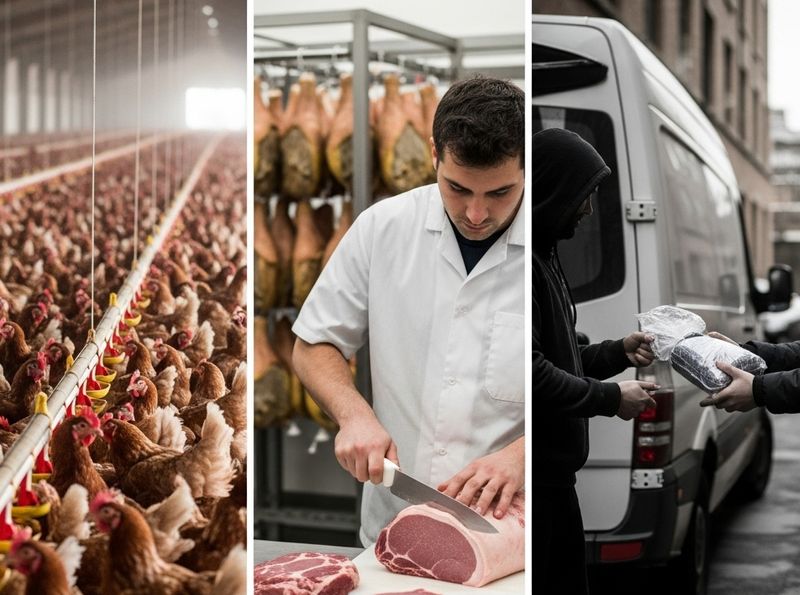
Market Pulse: Poland's Poultry Exports Push, German Pork Sector Under Pressure, and UK's Illegal Meat Crisis
Poland targets new markets as Germany's pork sector feels the squeeze and the UK tackles a biosecurity crisis.
Market Strategy: Poland's Poultry Sector Targets New Asian Markets
What happened: A high-level trade delegation representing Poland's major poultry producers has embarked on a mission to Southeast Asia, with a specific focus on Vietnam and the Philippines. The government-backed initiative aims to secure new long-term export agreements for Polish chicken and turkey products, capitalizing on a recent record year for domestic production.
Why it matters: This strategic push demonstrates Poland's ambition to solidify its position as Europe's leading poultry exporter by diversifying beyond the highly competitive intra-EU market. Successfully opening these new channels would reduce dependency on traditional European partners and tap into regions with growing demand for high-quality protein, providing a significant boost to the Polish agricultural economy.
Implications & suggested actions:
Exporters & Processors: This move will create increased competition for other global poultry suppliers targeting Asian markets. Polish producers must ensure their operations are certified to meet the specific import and Halal requirements of these new markets.
Logistics & Cold Chain: The expansion creates new opportunities for logistics providers specializing in long-haul refrigerated transport and storage in the target regions.
Investors: Poland's aggressive export strategy makes its poultry sector an attractive area for investment, particularly in companies poised to scale up production and processing capacity.
Industry Pressure: German Pork Processors Face Consolidation Amid Cost Squeeze
What happened: Recent industry data shows that while German pork production saw a slight increase in the first half of 2025, the overall trend for the meat sector remains challenging. Associations like the German Meat Industry Association (VDF) continue to voice concerns that escalating energy costs and significant regulatory burdens are creating immense financial pressure, particularly for small and medium-sized pork processors, fueling a trend of market consolidation.
Why it matters: Germany's pork sector, a cornerstone of the entire EU market, is undergoing a significant structural shift. The immense pressure on smaller, often family-run, businesses could lead to reduced national processing capacity and less supplier choice for wholesalers and retailers. In the long term, this could lead to a market dominated by fewer, larger players and potential price volatility.
Implications & suggested actions:
Wholesale Buyers & Retailers: Be aware that the diversity of suppliers in the German pork market may shrink. It is prudent to strengthen relationships with key larger suppliers and explore sourcing from other EU countries to mitigate risk.
Equipment & Technology Suppliers: There is a clear opportunity to market energy-efficient processing and refrigeration technology to German businesses looking to cut operational costs.
Processors: Larger operators may find strategic acquisition opportunities. Smaller businesses should urgently review their energy efficiency and operational overheads to remain competitive.
Regulation: UK Parliament Committee Warns of "Illegal Meat Crisis"
What happened: The UK's Environment, Food and Rural Affairs (EFRA) Committee has published a highly critical report, 'Biosecurity at the Border: Britain's Illegal Meat Crisis', stating the government's approach to personal meat imports is "unnecessarily lax" and "too reactive." The report identifies a surge in illegal imports driven by a demand for cheap meat.
Why it matters: This influx of unregulated meat poses a significant biosecurity threat, increasing the risk of devastating animal diseases like African Swine Fever entering the UK. An outbreak would immediately halt pork exports and lead to widespread culling. The committee's findings suggest a breakdown in communication between government and port authorities and a lack of effective deterrents.
Implications & suggested actions:
Government & Regulators: The report strongly urges the creation of a national task force, a full risk assessment, and the implementation of real deterrents, including fines and prosecutions for offenders.
Processors & Farmers: The crisis reinforces the value proposition of legally sourced, traceable British meat. This is an opportunity to highlight domestic safety and quality standards in communications with customers.
Logistics & Haulage: Be prepared for potentially stricter checks and new regulations at ports as authorities respond to the committee's recommendations.
